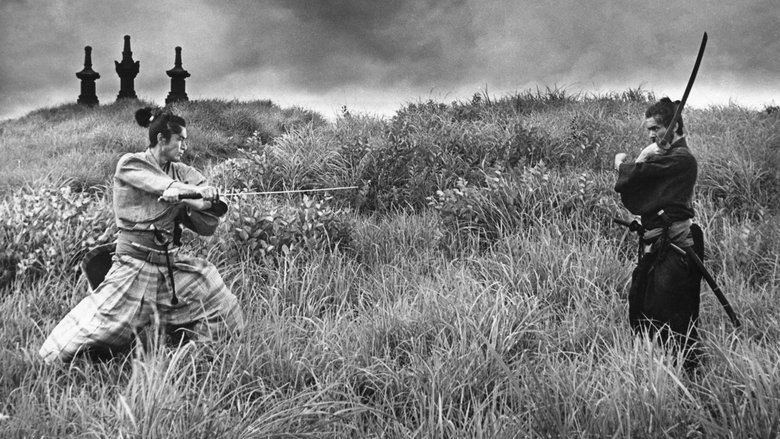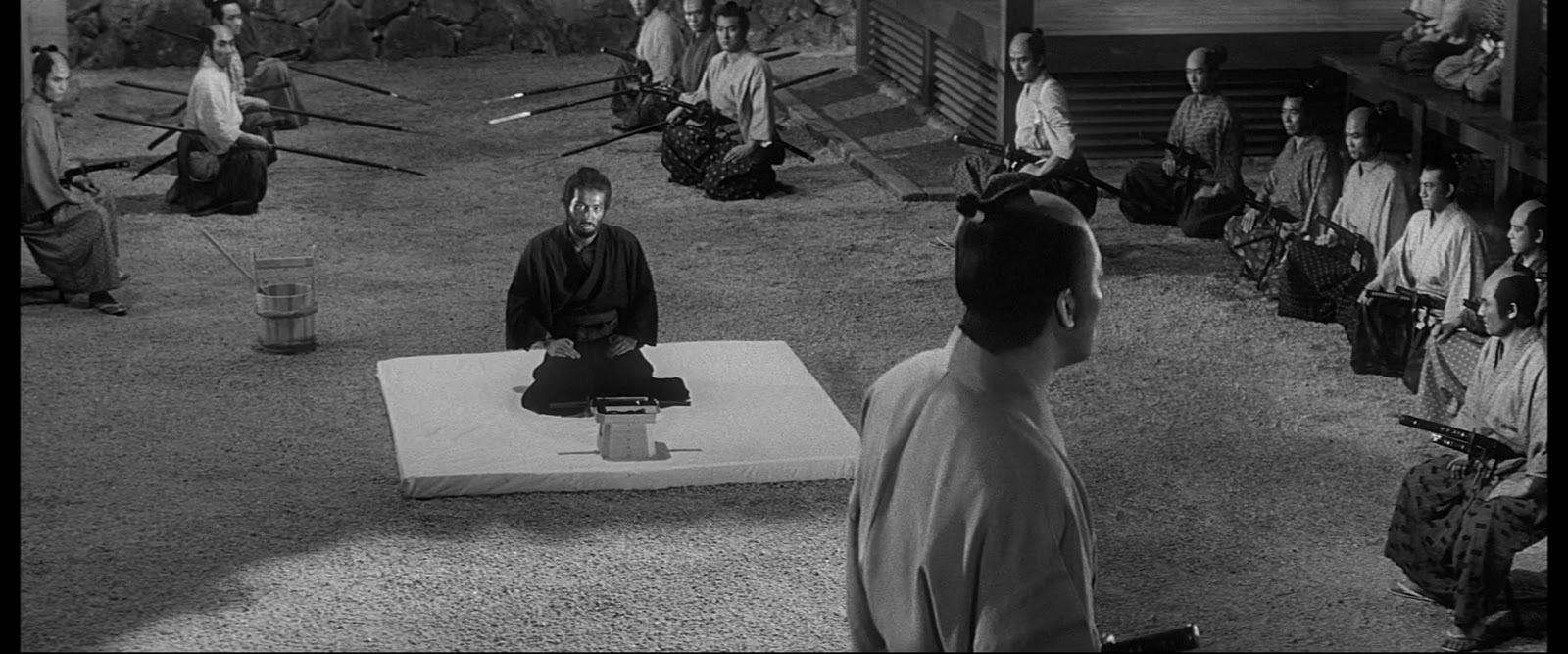← Back to Reviews

in
#396 - Harakiri
Masaki Kobayashi, 1962

An old ronin arrives at the gates of a castle with the intention of committing "harakiri", the traditional Japanese act of ritual suicide, in the castle's courtyard.
If you were ever looking for a film that perfectly embodied the concept of dramatic irony, then it'd be hard to look much further than Harakiri, a film so fundamentally rooted in fatalism and honour (in both the positive and negative facets of the word) that it practically demands to be watched. Starring Tatsuya Nakadai (an actor who has appeared in quite a few of the last few Japanese films I've watched and has thus started to become an actor of note for me) as the main character, it juggles its framing story (arguably its A-plot) with various episodic recollections that initially seem disconnected but soon go on to form a disturbingly coherent plot that explains Nakadai's motivations for wishing to present himself before a respectable house and commit harakiri despite the polite yet restrictive requirements laid down by the house's ruling body.
If I had to pick out a flaw that threatens to unravel the otherwise masterful handling of Harakiri, it's that its fatalistic nature in regards to its themes means that the narrative is, for much of the film's runnning time, actually somewhat predictable despite its considerable number of twists. However, Harakiri is one of those rare cases of a story where being able to accurately predict how a given narrative plays out doesn't actually ruin one's enjoyment of a film but actually enhances it. The film's second act, which entails Nakadai's character relaying his own tale of tragedy to a rather indifferent group of individuals, is predictable mainly because it's not hard to fill in the dots that led to the developments depicted in the film's surprisingly graphic first act. As a result, the second act ends up being the weakest of the three as it exists mainly to fill in the gaps, though its tale of familial tragedy brought on by dramatic irony (I told you that's what defines this film) isn't any less heart-rending as a result. As a result, by the time the second act concludes one might very well wonder as I did where the story could possibly go from there.
Well, suffice to say that the third act definitely does not deserve to be described to those who have not seen the movie (and I try to write reviews for those who have not seen said movies). While Harakiri's second act may threaten to drag the film to a halt, it manages not to and instead sets up one of the most compelling third acts I've seen in quite some time. Nakadai may have been about thirty around the time of this film's production but he perfectly embodies a very worn-out and embittered protagonist whose awareness of his own narrative does little to deter him, and when the film does deliver on the promises of violence that its title and narrative makes, it is not titillating or awe-inspiring. It is merely the inception and conclusion of a narrative that has been very well mapped-out before it has been carried out, but that does not matter in the slightest. What matters is that people on both sides of the camera give their all to an emotionally draining story that may possibly bore some people but is compelling through its introspective moments and its intense action-oriented moments. It's a credit to this film that it doesn't play the absurdity of the situation for any kind of basic satirical points, but instead demands one's full commitment to understanding how such an absurd situation can be completely serious depending on your perspective. If you haven't already seen Harakiri, do consider it highly recommended.
Masaki Kobayashi, 1962

An old ronin arrives at the gates of a castle with the intention of committing "harakiri", the traditional Japanese act of ritual suicide, in the castle's courtyard.
If you were ever looking for a film that perfectly embodied the concept of dramatic irony, then it'd be hard to look much further than Harakiri, a film so fundamentally rooted in fatalism and honour (in both the positive and negative facets of the word) that it practically demands to be watched. Starring Tatsuya Nakadai (an actor who has appeared in quite a few of the last few Japanese films I've watched and has thus started to become an actor of note for me) as the main character, it juggles its framing story (arguably its A-plot) with various episodic recollections that initially seem disconnected but soon go on to form a disturbingly coherent plot that explains Nakadai's motivations for wishing to present himself before a respectable house and commit harakiri despite the polite yet restrictive requirements laid down by the house's ruling body.
If I had to pick out a flaw that threatens to unravel the otherwise masterful handling of Harakiri, it's that its fatalistic nature in regards to its themes means that the narrative is, for much of the film's runnning time, actually somewhat predictable despite its considerable number of twists. However, Harakiri is one of those rare cases of a story where being able to accurately predict how a given narrative plays out doesn't actually ruin one's enjoyment of a film but actually enhances it. The film's second act, which entails Nakadai's character relaying his own tale of tragedy to a rather indifferent group of individuals, is predictable mainly because it's not hard to fill in the dots that led to the developments depicted in the film's surprisingly graphic first act. As a result, the second act ends up being the weakest of the three as it exists mainly to fill in the gaps, though its tale of familial tragedy brought on by dramatic irony (I told you that's what defines this film) isn't any less heart-rending as a result. As a result, by the time the second act concludes one might very well wonder as I did where the story could possibly go from there.
Well, suffice to say that the third act definitely does not deserve to be described to those who have not seen the movie (and I try to write reviews for those who have not seen said movies). While Harakiri's second act may threaten to drag the film to a halt, it manages not to and instead sets up one of the most compelling third acts I've seen in quite some time. Nakadai may have been about thirty around the time of this film's production but he perfectly embodies a very worn-out and embittered protagonist whose awareness of his own narrative does little to deter him, and when the film does deliver on the promises of violence that its title and narrative makes, it is not titillating or awe-inspiring. It is merely the inception and conclusion of a narrative that has been very well mapped-out before it has been carried out, but that does not matter in the slightest. What matters is that people on both sides of the camera give their all to an emotionally draining story that may possibly bore some people but is compelling through its introspective moments and its intense action-oriented moments. It's a credit to this film that it doesn't play the absurdity of the situation for any kind of basic satirical points, but instead demands one's full commitment to understanding how such an absurd situation can be completely serious depending on your perspective. If you haven't already seen Harakiri, do consider it highly recommended.
